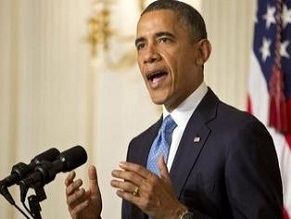|
World Jewish News

US President Barack Obama at the White House Photo: Reuters
|
Obama to confront a united Congress on Iran
27.01.2014, Israel and the World Rarely does Congress find itself united on an issue, much less allied against the president. And yet on Tuesday night, amid a litany of domestic proposals that fall cleanly along party lines, US President Barack Obama will confront just that sort of bipartisanship against one of his policies: how to handle Iran.
Obama has been working the phones with members of the Senate for months now, calling privately on its leadership to pause work on a bill that would trigger new sanctions against the Islamic Republic should negotiations fail to reach a final-status agreement over its nuclear program.
That's because key members of the upper chamber— including Senate Foreign Relations Committee chairman Robert Menendez (D-NJ) and his Republican counterparts— insist on an insurance policy that will apply pressure on Iran throughout the diplomatic process. Sanctions legislation from Congress has led Iran to the negotiating table, they say; by that logic, more sanctions will only encourage the process along and force the Iranians to capitulate further.
In November, an initial deal between Iran and world powers gave the parties six months to negotiate a comprehensive agreement. In the meantime, Iran agreed to halt its enrichment of uranium to high grades while the Obama administration agreed not to impose any new nuclear-related sanctions.
Reaching a comprehensive accord will be a difficult task that even the president and his allies agree is unlikely to succeed. The president himself has put the chances of success at less than 50 percent. But the US must demonstrate a good-faith diplomatic effort to its allies, the White House argues; and new sanctions from Congress would directly undermine that strategy, and the language of the interim deal, leaving the president only with the option of military force.
The president will enter the House chamber on Tuesday night and face 59 senators who have publicly endorsed the 'trigger' bill, along with 400 representatives who, over the summer, passed even harsher sanctions legislation aimed at cutting Iran's remaining crude oil exports in half.
How Obama lays out his case against new legislation will be important to watch for several reasons. Most obviously, the president does not have an appetite for military conflict, and believes the public is on his side; and while the speech will be directed at Congress, the White House is well aware that this speech is his most significant policy platform of the year (members of Congress, as it turns out, are aware of that as well).
The president, therefore, might find it convenient to place on Congress the burden of such inevitable conflict should they pass a bill and undermines peace talks. While he'll certainly seek to reassure them— expect to hear him reiterate that 'no option is off the table' in handling the crisis — he may also try and threaten them with the specter of adverse consequences.
And yet Obama must also walk another fine line, away from redlines. Should he state, as the White House has implied, that the only option after the failure of diplomacy is war, then he obligates himself to conflict should talks fail in six months time.
That may be the lesson he learned from the Syrian chemical crisis in August: on matters of foreign policy, do not issue threats you are not prepared to uphold. In Tuesday's speech, read between the redlines: listen carefully for what the president is truly prepared to do.
By MICHAEL WILNER
JPost.com
|
|
